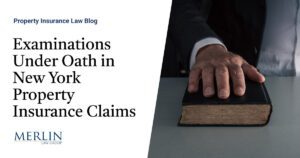Treble Damages are Punitive & Excluded by Policy
Punitive Damages Fail Their Purpose if Insurable
 An insurer sought a declaratory judgment for the purpose of adjudicating whether its insurance policy excluded treble damages pursuant to Oklahoma state statute 47 O.S.2011, § 10-103. The Insurer filed a motion for summary judgment, and the trial court concluded the treble damages provided by 47 O.S. 2011, § 10-103 were punitive in nature, and the damages were excluded by a clause excluding punitive damages. In Progressive Direct Insurance Company v. Ikia Pope, and Brandi Powell v. Ikia Pope, No. 119309, 2022 OK 4, Supreme Court of Oklahoma (January 11, 2022) the Oklahoma Supreme Court resolved the dispute.
An insurer sought a declaratory judgment for the purpose of adjudicating whether its insurance policy excluded treble damages pursuant to Oklahoma state statute 47 O.S.2011, § 10-103. The Insurer filed a motion for summary judgment, and the trial court concluded the treble damages provided by 47 O.S. 2011, § 10-103 were punitive in nature, and the damages were excluded by a clause excluding punitive damages. In Progressive Direct Insurance Company v. Ikia Pope, and Brandi Powell v. Ikia Pope, No. 119309, 2022 OK 4, Supreme Court of Oklahoma (January 11, 2022) the Oklahoma Supreme Court resolved the dispute.
FACTS
Ikia Pope and Brandi Powell were in a motor vehicle collision. Pope left the scene of the collision. Powell alleged Pope drove a vehicle owned by third parties who gave permission for Pope to drive the vehicle. Progressive Direct Insurance Company insured the vehicle driven by Pope.
Powell made bodily injury and property damage claims with Progressive Direct Insurance Company (insurer). Powell asserted she was entitled to treble property damages pursuant to a statute which states that “the driver of any vehicle involved in an accident resulting only in damage to a vehicle … Any person failing to stop or comply with said requirements under such circumstances shall be guilty of a … In addition to the criminal penalties imposed by this section, any person violating the provisions of this section shall be subject to liability for damages in an amount equal to three times the value of the damage caused by the accident. Said damages shall be recoverable in a civil action.” [47 O.S.2011, § 10-103 (emphasis added).]
Progressive Direct Insurance Company (insurer) alleged treble damages pursuant to the statute did not apply to its insurance policy because punitive damages were clearly excluded.
The trial court stated the issue for adjudication was whether public policy required statutory treble damages to be excluded from the policy’s coverage. The trial court concluded the treble damages in 47 O.S. § 10-103 “is more aligned with the definition of punitive damages than it is with non-punitive or compensatory [damages].” The trial court concluded a punitive purpose in statutory language would be frustrated by allowing a driver to shift the statutory economic burden to an insurer.
ANALYSIS
Generally, compensatory damages “are intended to redress the concrete loss that the plaintiff has suffered by reason of the defendant’s wrongful conduct;” but “punitive damages serve a broader function; they are aimed at deterrence and retribution.”
Statutorily specified damages are slightly different in that they may be compensatory, punitive, or a mixture of the two depending upon the legislative purpose served by the particular statutory damages.
The obvious public policy behind the treble damages provision is to provide an added level of deterrence against hit-and-run drivers who damage attended vehicles. The Legislature’s public policy for imposing a criminal penalty and the treble damages in 47 O.S. § 10-103 were to create a deterrence by imposing punitive measures upon a driver “involved in an accident who did not fulfill the requirements of 47 O.S. § 10-104 and fled the scene of the accident.
The Circuit Court focused on two issues:
The amount multiplied was a small determined statutory amount, $500.00; and
Damages could be trebled without any showing the defendant’s conduct was an entire lack of care, willful misconduct, wantonness, or conscious indifference to consequences.
Some states allow the insurability of punitive damages directly or vicariously assessed against the insured when provided by the insurance policy. More than twenty-five years ago, the United States Court of Appeals for the Tenth Circuit stated: “Oklahoma courts adhere to the view that public policy prohibits liability insurance coverage of punitive damages except where the party seeking the benefit of insurance coverage has been held liable for punitive damages solely due to conduct of another, under principles of vicarious liability.” In Dayton Hudson Corp. v. American Mut. Liability Ins. Co., 1980 OK 193, 621 P.2d 1155, 16 A.L.R.4th 1, this Court explained a policy provision requiring an insurer to pay “for all sums which the insured might become legally obligated to pay” was sufficiently broad to include liability for punitive damages when such damages were not “specifically excluded” by the policy.
This Court has recognized for more than one-hundred years that an insurer and insured are free to agree to a policy’s provisions and how they are construed, provided such agreement does not conflict with public policy. The policy states the insurer “will pay damages for bodily injury and property damage for which an insured person becomes legally responsible because of an accident” but excludes from coverage “bodily injury or property damage caused by an intentional act of that insured person,” and “punitive or exemplary damages.”
An insurance policy is issued pursuant to statutes, and the provisions of those statutes are given force and effect as if written into the policy. Courts construe terms in an insurance policy consistent with insurance statutes on the same subject. The punitive nature of treble damages is not ambiguous. Statutes combining a criminal penalty and a civil statutory punitive damages provision existed many years prior to 1987.
Generally, a statutory multiplier for damages has a punitive nature when damages are meant to punish “the wrongdoer” and to act as a deterrent to others. The nature of the wrongful conduct sufficient to support an award of statutory punitive damages is not necessarily synonymous with wrongful conduct to support an award of common-law punitive damages.
Considering the well-known history of statutorily multiplied damages in the context of a combined punitive and deterrent purpose, our discussion of the Legislature’s purpose for 47 O.S. § 10-103 in 1987, and construction of this statute as part of the insurance policy, the Supreme Court concluded the statutory treble damages in 47 O.S.2011, § 10-103 are for the purpose of controlling conduct of drivers and are punitive in nature. Therefore, the treble damages in 47 O.S.2011, § 10-103 are punitive for the purpose of the exclusion in the policy.
The treble damages provision in 47 O.S.2011, § 10-103 had a primary purpose to deter hit-and-run drivers, and “is more aligned with the definition of punitive damages than it is with non-punitive or compensatory” damages and the statutory treble damages in 47 O.S. 2011, § 10-103 were excluded by the policy.
ZALMA OPINION
It should be axiomatic, and it is in Oklahoma, that an insurer and insured are free to agree to a policy’s provisions. The exclusion for intentional acts and punitive damages was conspicuous, plain and clear and the Supreme Court concluded that trial court was correct when it refused to allow coverage for the punishment damages established by the statute.
© 2022 – Barry Zalma
Barry Zalma, Esq., CFE, now limits his practice to service as an insurance consultant specializing in insurance coverage, insurance claims handling, insurance bad faith and insurance fraud almost equally for insurers and policyholders. Mr. Zalma practiced law in California for more than 44 years as an insurance coverage and claims handling lawyer and more than 54 years in the insurance business.
You can subscribe to “Zalma on Insurance” at https://zalmaoninsurance.locals.com/subscribe and “Excellence in Claims Handling” at https://barryzalma.substack.com/welcome.
You can contact Mr. Zalma at https://www.zalma.com, https://www.claimschool.com, zalma@claimschool.com and zalma@zalma.com . Mr. Zalma is the first recipient of the first annual Claims Magazine/ACE Legend Award.
You may find interesting the podcast “Zalma On Insurance” at https://anchor.fm/barry-zalma; you should see Barry Zalma’s videos on YouTube- https://www.youtube.com/channel/UCysiZklEtxZsSF9DfC0Expg; or videos on https://rumble.com/zalma. Go to the Insurance Claims Library – https://zalma.com/blog/insurance-claims–library/ The last two issues of ZIFL are available at https://zalma.com/zalmas-insurance-fraud-letter-2/


